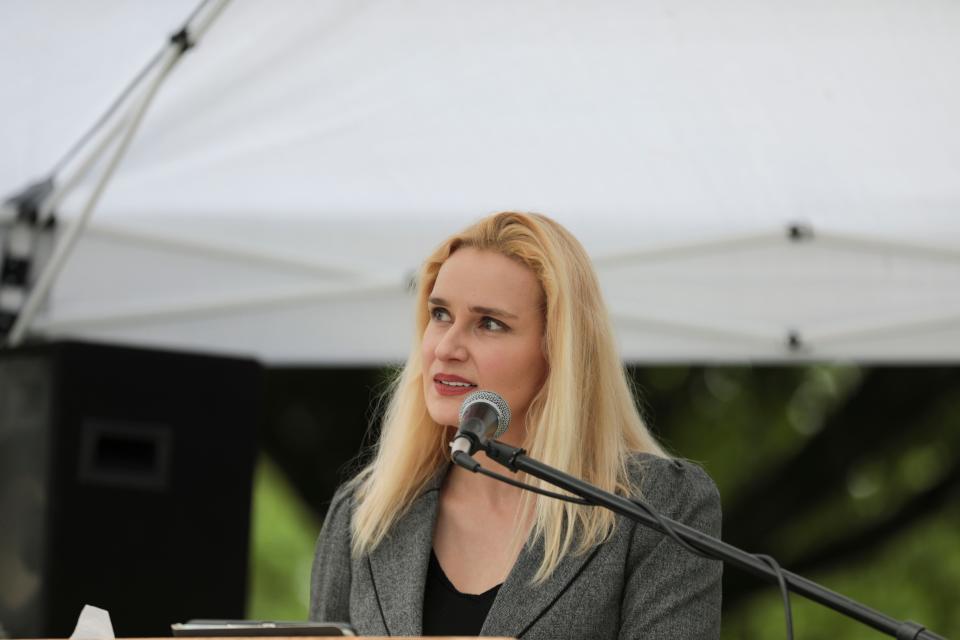Vote 'mixed bag' for the struggle to add mobile crisis team in Salem
The push to create a mobile crisis unit to respond to people experiencing homelessness and behavioral health crises took one step forward, one step back during Monday's Salem City Council meeting.
Councilor Vanessa Nordyke, a longtime advocate for bringing a civilian-led crisis unit to the city, brought forth two motions.
A motion to add funding for the unit to a list of funding requests to take to the Oregon State Legislature failed in a tie vote, with councilors Virginia Stapleton, Chris Hoy, Micki Varney and Mayor Chuck Bennett voting against it and councilor Trevor Phillips absent.
Nordyke's motion to direct city staff to identify funding sources for a mobile crisis unit unanimously passed council.
She said Tuesday the results were a "mixed bag."

The vote to find funding gave some forward momentum to the effort, Nordyke said, adding that she is confident staff will find the money to fund the team.
"This vote was not surprising given the outpouring of support from business owners, mental health professionals, homeless advocates and concerned citizens urging City Council to pass the motion," she said.
But the vote rejecting the idea to request $2 million to operate the team for two years from the Legislature means the city will have to look for funds elsewhere.
The $700,000 estimated annual cost of the team would be a fraction of the city's $700 million budget, Nordyke said.
Those voting against the motion to request funding from the state Legislature expressed uncertainty that the project would even be considered, said a Marion County crisis team had already received some funding and thought other projects needed to be given priority when it came to state funds.
Nordyke said Monday that it wouldn't hurt to ask the Legislature for funding, especially because the ask would go through next year when there will be new legislators in office.
Nobody has a "crystal ball" and knows for sure the Legislature would nix giving $2 million for the team, she added.
Furthermore, the Marion County team is still in the planning stages.
Nordyke said she had concerns about the hours the team would work, its lack of an EMT or nurse aide on the team and the fact that it would only cover Marion County and not West Salem.
Nordyke and other advocates have for years stressed the need for a non-police response unit, similar to CAHOOTS in Eugene.
An analysis found Eugene's crisis response team saves the city about $8.5 million a year. In 2017, CAHOOTS responded to 17% of the Eugene Police Department's overall call volume. The CAHOOTS program costs about $2.1 million annually. It is funded by Eugene, Springfield and Lane County.
By comparison, the Eugene and Springfield police departments have combined annual budgets of $90 million.
Cities nationwide have looked to Eugene as a model for mobile crisis teams. Earlier this month, the U.S. Department of Health and Human Services announced its financial support for the expansion of mobile mental-health crisis intervention units in Oregon, the first state to receive the federal aid.
Read more: Eugene-based CAHOOTS launches mobile crisis response 101 course
Nordyke said several of her constituents expressed dismay and anger over the decision to not ask the Legislature for funding.
"Refusing to ask the Legislature for money is a missed opportunity," she said. "If Salem City Council does not advocate for Salem, then who will?"
Nordyke added that she thinks to gain traction, more education about the benefits of the team is needed.
"We're asking the city to take a leap of faith and invest in a project and do something they've never done before," she said. "It's a matter of educating leaders so that they understand what the crisis unit will do and how it will help people across our community."
Reporter Whitney Woodworth covers city hall, economic development and business for the Statesman Journal. For questions, comments and news tips, email wmwoodworth@statesmanjournal.com, call 503-910-6616 or follow on Twitter @wmwoodworth.
This article originally appeared on Salem Statesman Journal: Vote 'mixed bag' for the struggle to add mobile crisis team in Salem

